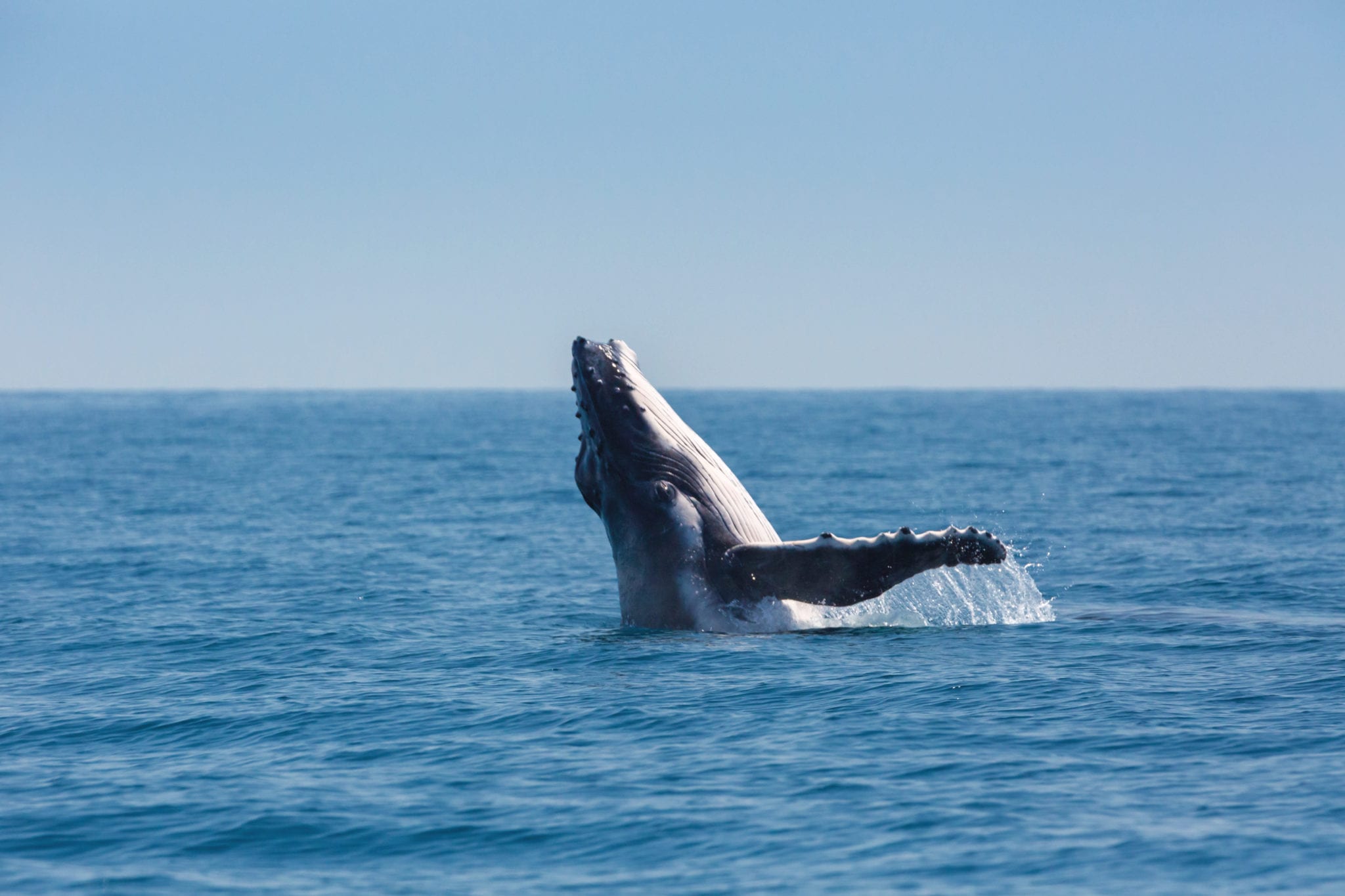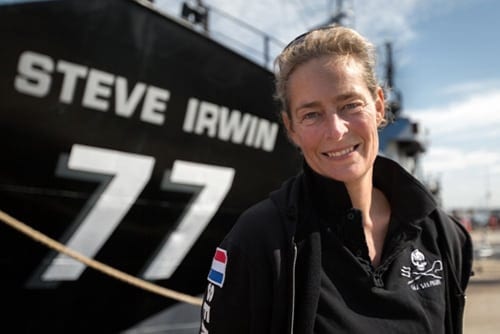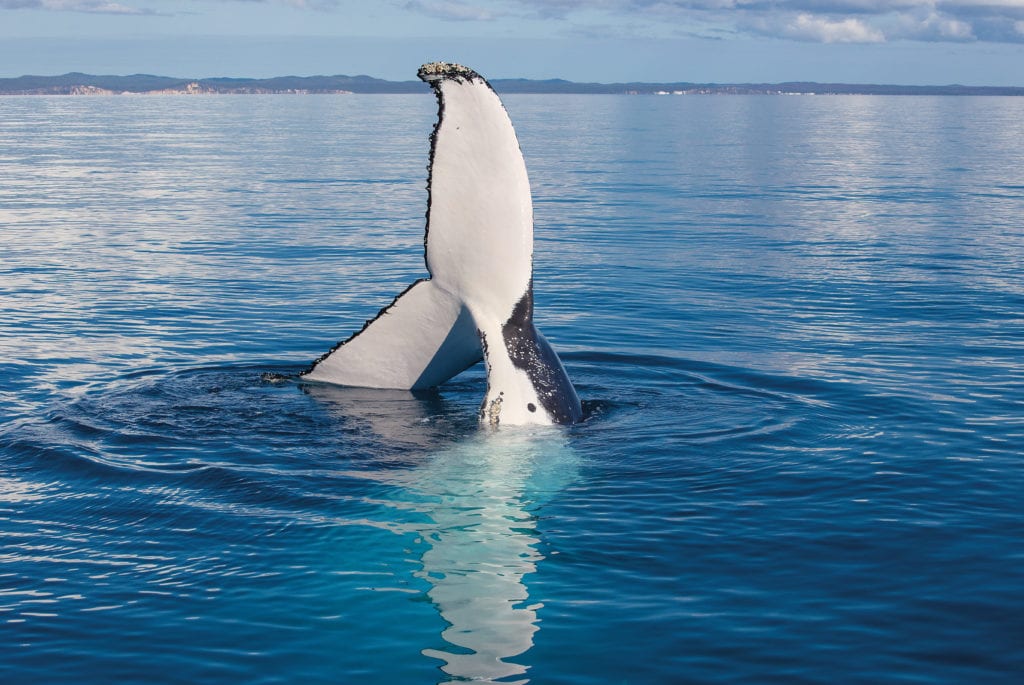08 Jul Whale hello there!

Whales spotted! The first humpback whales of this season’s migration have been seen heading north. These majestic animals make the trek from the chilling Antarctic waters to the tropical temperatures of the Queensland coast every year.
The humpback whales that visit our waters are here to breed and give birth to their young. They will go as far north as Cairns and choose the waters of the Great Barrier Reef for the protection it provides from swell, the absence of predators and the ideal birthing and mating temperature (talk about setting the mood!).
Over-whale-ming humpback facts
- The bumps appearing on the whale’s skin are called knobs and are in fact hair follicles each containing a single thick hair. The purpose of the hair is unknown but is assumed to detect motion.
- Females will lose over half of their body weight on their annual migration journey.
- New born calves can weigh up to a ton.
- The mother’s milk is up to 60% fat and the consistency of toothpaste (try putting that on your cereal!).
- Calves can drink about 600 litres of milk and gain up to 50kgs a day.
- Whales are known to feed in groups, by circling their food source under the water while blowing bubbles, creating a bubble curtain trapping the food. Once the circle is completely enclosed the pod of whales together will swim through the centre of the circle collecting all the trapped food. This action is called bubble netting.
- Adult humpbacks can eat up to 1,360 kg of food per day.
- Only the males are known to sing, although both males and females sound certain social calls while they’re feeding.
- You can’t talk whale but it is possible to hear whale. Dive 2 meters below the surface of the water, if there are any active humpbacks close by you will be able to hear their songs.
- A full grown humpback whale’s heart beat is around 8 – 10 beats per minute.
- Females will breed every 2 – 3 years, with a gestation period of 1 year.
- New born calves are pale grey in colour for the first day.
How can we see whales?
The great thing about whale season in Queensland is that you don’t have to travel far to be treated to an amazing spectacle. Many whales will travel close to shore for protection. Head to any of the 1770 and Agnes Water beaches or look outs and keep your eyes on the horizon. Look for upward sprays of water, tail flicks and aerial displays. For an elevated look out, head out on 1770 LARC! Tours full day Paradise Tour and do your spotting from the top of the Bustard Head Lighthouse. For anyone boating during the season make sure to follow Queensland Whale Watching Guidelines.
Threats to whales
Since being declared an endangered species and the whaling of Humpbacks banned, we have seen an increase in the Humpback population. However new threats to whale species are becoming more evident. These threats include fishing and shark nets, ship collisions, oils spills, plastic pollution, climate change, habitat degradation and over fishing.
What you can do to help?
You’ve heard it before, but we are going to say it again anyway…. A little goes a long way. Rethink your single use plastic consumption. Swap out disposables for reusables. Join in a beach clean team. Help educate the new generation. Support larger groups that can do big operations (check out our skipper Wyanda and her Sea Shepard Team).
Report your sightings – GBRMPA and Eye on the Reef have a great free app that you can download on your phone. With this easy to use app you can report not just whale sightings, but any marine animal sighting. The more sightings reported the more resources that can be provided by government for support. You can also view all animal sightings recorded in your area.

1770 LARC! Tours Skipper Wyanda dedicates part of her year to Sea Shepherd
It was whaley nice to meet you
The whales will grace us with their presence until the end of October and then continue on their journey back to the krill rich waters of the Antarctic. Once home the new calves, mothers and males will feast together building up new blubber supplies, ensuring that they can all embark on another tropical holiday next year.

Humpback tail wave – Hervey Bay. Image courtesy of Tourism and Events Queensland
Heading image also courtesy of Tourism and Events Queensland[/vc_column_text][/vc_column][/vc_row]

TB
Posted at 19:15h, 08 JulyLooking forward to seeing them soon… it’s been a whale….
LARC team
Posted at 07:53h, 10 JulyWhale we will be seeing you soon.